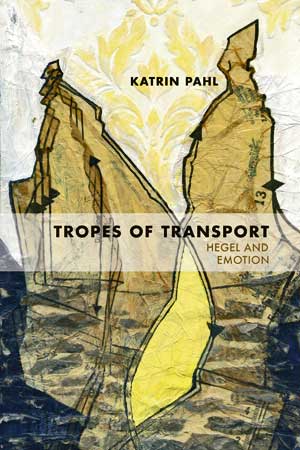
Hegel is not a very agreeable philosopher—that much can probably be agreed upon. But the very fact that he has come to stand both for the cold imperialism of an all-appropriating spirit and for a restless openness to alterity, contingency, and vulnerability, goes to prove that what we refer to with the one name “Hegel” still moves.
Hegel introduced philosophy to a dynamic notion of truth. Tropes of Transport locates the tropes that render truth dynamic in the emotional register. Reading primarily the Phenomenology of Spirit, I trace how emotionality (dis)organizes the logical, quasi-existential, and narrative unfolding of Hegel’s text.
To the field of affect and emotion studies, my analysis of Hegel contributes an account of affect as transport. “Transports” carry one out of oneself and to a different self. They thus mediate between and within selves (including impersonal selves). Transports pluralize subjects and create a texture of sympathy.
Specifically, I explore the transports of “release,” “juggle,” “acknowledging,” “tremble,” and “broken.” These are key words from Hegel’s text and I have organized each chapter in the second part of the book around one of these tropes.
Here is an impressionistic picture of these chapters: Transports are modes of self-relation that both project future selves and remember past selves. Even releasing the form of the self forges self-relation, but this relation becomes cracked in the process. Hegel’s speculative logic is a constant juggle of contradictory demands—for example, of distance and involvement. My reading of Hegel undoes the dichotomy of rationality and emotionality by drawing on emotion to propel self-reflection and on self-distance to thicken the experience of emotion. To tremble means to blur the shape of the self and the line between intra- and intersubjectivity. “Acknowledging” renders cognition and recognition as always again incipient movements toward another self and toward the practice of thinking. In “Broken,” I challenge the assumption that the promise or threat of Hegel’s philosophy is to overcome divisions. Instead, I consider Hegelian dialectic as a great tool not for reconciling what is torn, but for reconciling oneself to tears.
I read Hegel’s work in dialogue with literary texts contemporary to him or to us. Tropes of Transport discusses Cixous and Lispector as well as Hölderlin and Goethe.
If you are interested in what Hegel says about emotion, go to the first (shorter) part of the book, “Emotional Subjects.” Here I discuss Hegel’s critical analyses of feeling (organized around the figure of the “heart”) and of righteous passion (in a chapter on “pathos”).
If you want to see how emotionality (dis)organizes Hegel’s text independently from his intention and his thematizing this role of emotion, start with the second part of the book, “Emotional Syntax.”
I am trained in philosophy and literary analysis. My particular take on the intersection of philosophy and literature consists in using the tools of a literary scholar to analyze a philosophical text.
I grew up with emotionality. Like everyone, in some sense. But my point here is that I have tended to try to figure out ways to grow up with and alongside emotionality, rather than growing up by dismissing emotionality as immature, irrational, or childish.
In my studies in philosophy, I was drawn to epistemology but I couldn’t find much explicit and sustained engagement by canonical philosophers with the role affect and emotion play—not only as a disturbance of rationality but as a partner, as it were, in philosophical attempts to envision and understand worlds.
Tropes of Transport furnishes some of this kind of engagement. I was looking for affect and emotion not as the object of philosophical knowledge but as philosophically acknowledged forces that propel and inhibit thought. This is why Tropes of Transport explores less what Hegel says about emotion than how emotion organizes and disorganizes his text.
I am not particularly fond of the crisis model and of vehement relations to emotionality. The crisis model creates pressure in order to enable release and transformation. This psychic hydraulics operates by repression and produces violent outbursts. I will grapple again with violent emotion in my next book on Kleist, but Tropes of Transport ends with an argument against emotional violence. I am concerned with developing a steady relation to the unsteadiness that is emotionality.
All this is to say that my work is driven by a pressing feeling that we need better and more ways to relate to emotional life. I am convinced that this relation needs to be more nuanced than unconditional celebration or unqualified elimination. I also hope that a more nuanced or plastic relation to emotional life will stretch our modes of thought, our rationality, and our logic, so that they can accommodate and accept more confusion, incongruence, and messiness.
For people who leaf through Tropes of Transport, I would want to bribe the goddess of chance to let the pages part at one of the points where I discuss the effects of free indirect discourse. For example this one, on page 196:
Then again, Hegel’s use of free indirect discourse gives him the liberty to swing all the way back to a sympathizing identification with the phrenologist. Hegel gives him credit, suggesting that the future of spirit harkens back to the phrenologist when he feels some embarrassment about his position. The thing that is the phrenologist’s mind knows embarrassment – a promising fact, one would think…
A mix of sincere identification and ironic distance characterizes all the discussions in the Phenomenology. Philosophical texts traditionally make atemporal truth claims in the name of the author. The Phenomenology’s conceit is that we are accompanying the self-assessment of exemplary worldviews. This conceit temporalizes truth and creates a complex temporal plasticity. The Phenomenology presents its epistemes by oscillating often imperceptibly between the voice of “natural consciousness” and the phenomenologist’s voice. Hegel thus uses a philosophical version of free indirect discourse—a narrative technique that blurs the distinction between the voice of the narrator and the voice of a character.
I find it crucial to attend to the workings of free indirect discourse in Hegel because such a practice of reading brings into view the situatedness of his truth claims and foregrounds the plasticity of emotional subjectivity. The topic of emotion is often used to buttress an unelastic first-person perspective. Free indirect discourse presents the difference between internal and external exchanges as hard to pin down. It thus facilitates an ethics of sympathy.
The fact that the Phenomenology has a protagonist (“consciousness”) and a first-person plural narrator (“we” – the phenomenologist/s) demands that the reader attend to the difference between the perspectives of the author, the narrator, and the protagonist. When Hegel discusses, for example, “feeling” or “pathos,” he doesn’t develop his theory of emotion. Instead, he offers a critical analysis of the assumptions at work when one conceives of emotion as feeling or as pathos. Free indirect discourse thus produces distance, but at the same time it allows for identification. It creates an intimacy with commonly dismissed positions that would be precluded by a more straightforward approach.
Hegel’s voice resonates through all of the shapes of consciousness and is in none of them. That is what makes him the villain of the history of philosophy. The villain is the figure who deceives, who assumes other identities—usually to get ahead. Hegel wears the masks of his protagonists in order to propel the development of self-consciousness. Consciousness makes its way through the phenomenological narrative by relentlessly rising above its station. All the subject positions of the Phenomenology—even the author and the reader—are villains in this sense. And the ethics of sympathy has just received a rather ironic touch.
I hope that Tropes of Transport encourages readers to develop the speculative tools, the attitude, and the awareness required to respond to the awkward, confusing, and equivocal demands of emotionality. I show that Hegelian dialectic serves as an important resource in this endeavor because it is precisely not a regulated process of calm resolution through the mediation of stable terms. Rather, it is a messy dynamic where each pole is folded into its opposite so that both continually and internally modify one another, and where knowledge or awareness doesn’t follow with necessity but “bursts forth” as if by accident.
Through the concepts of transport and emotionality, Tropes of Transport generates accounts of affective life that are attentive to both its materiality (foregrounded by affect theory) and its self-reflexivity or subjectivity (usually associated with emotion). The book, thus, treats the concepts of emotion and affect not so much as oppositional terms than as part of a series of terms that modulates questions of subjectivity, materiality, movement, relationality, and becoming.
While I insist on subjectivity, I am not trying to resurrect the notion of the subject that has been successfully deconstructed. Far from conjuring up the unified subject, I develop an account of emotional subjectivity as plural and torn. Less interested in the subject as person or autonomous agent, I turn my attention to impersonal forms of subjectivity—where subjectivity simply means self-reflexivity and self-reflexivity need not be conscious.
Transports transform and they create a multiplicity of selves along the way. The emotional subject is never an individual—it is divided or multiplied within by the history of its previous figurations that are aufgehoben or folded into the story of its future unfoldings.
Every seemingly independent individual that forms emotional relations to others is itself already mediated, that is to say, it is the result of a history of emotional self-transformations that, each time, involve the identification with others and that also, each time, deposit a remainder of otherness within the self.
Hegel finds subjectivity on both sides of the conscious human individual: in the self-reflexivity of plants, for example, as well as in the worlds generated by spirit. In Tropes of Transport, I attend, in particular, to text and textuality as forms of impersonal self-relations.
If all goes well, the account of emotion proposed in this book encourages hearts to stop laboring at dramatizing passion and to embrace lightheartedness instead.


Katrin Pahl is Assistant Professor of German, and co-director of the Women, Gender, and Sexuality Studies Program, at the Johns Hopkins University. Besides Tropes of Transport: Hegel and Emotion, featured on Rorotoko, she has authored numerous essays, edited a special issue of the Modern Language Notes, and is currently writing a book on the overlap of image and word in Kleist’s theater.